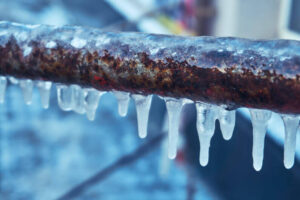Winter Weather & Freezing Temps: Tips to Avoid Damage
How to prevent pipes from freezing and what to do if they do freeze
This time of year, with the winter temperatures coming across much of the country, it is so important to protect your home or property from such elements as ice, snow, and wind. BluSky recommends several ways to prevent pipes from freezing and what to do if they do freeze.
“Pipes can freeze for any combination of reasons,” explains Denise Harrison, BluSky director of risk operations. “Quick drops in temperature to 20 degrees Fahrenheit or below, or extended hours below 32 degrees can cause it. Poor insulation or setting thermostats too low can make it more likely to happen.”
According to Harrison, there are a few steps business and residential property owners can take that will dramatically reduce the risk of frozen pipes.

How To Keep Pipes From Freezing
“You can’t keep the temperature from dropping but you can protect your pipes,” Harrison said. “If you haven’t already done so, insulate any pipes in crawl spaces or attics.”
Pipe freezing is especially an issue in warmer climates where pipes run through un-insulated or under-insulated spaces when frigid temperatures arrive. It is important to insulate both hot and cold lines and seal leaks that let cold air into spaces where pipes are located. Disconnecting garden hoses and draining sprinkler systems will reduce the chance of freezing at those points as well.
What To Do When A Hard Freeze Is Coming
Harrison shared steps for property owners to take when a hard freeze is coming.
“Let warm water trickle from faucets overnight especially near exterior walls, and open cabinet doors to allow heat to reach uninsulated pipes under sinks,” said Harrison. “Don’t turn your thermostat down below 65 degrees during extreme cold because further drops in temperature could be enough to cause a problem. Your heating bill may go up a little, but that’s better than an expensive repair job.”
What To Do If A Pipe Freezes
“Don’t assume your pipes will automatically burst if they’ve frozen,” Harrison added. “No reason to panic yet.”
The first step if a pipe freezes is to turn on faucets and leave them on. As the frozen area starts to melt, water will start moving again and help more ice to melt. If it’s possible to locate the frozen area of the pipe, a property owner can apply heat with an electric heating pad, electric hair dryer or portable space heater, or wrap the pipes with towels soaked in hot water.
“Never use a blowtorch, kerosene or propane heater or other open flame that could create a fire hazard,” Harrison said. “Devices like that could also boil the water and cause the pipe to explode.”
If those steps don’t do the trick or if a property owner doesn’t feel confident about performing them, it’s time to call a licensed plumber.
What To Do If A Pipe Bursts
“Turn the water off at the main shutoff valve and leave the faucets on,” said Harrison. “Then call a licensed plumber immediately to repair the pipe.”
A burst pipe can result in water damage, Harrison added. Depending on the extent of the damage, the next call should be to a reputable property restoration company to extract the water and dry the structure to prevent secondary damage and mold from developing.
###
About BluSky Restoration Contractors, LLC
BluSky Restoration Contractors, LLC is a full-service national restoration contractor with locations coast to coast. We provide residential, commercial, industrial, governmental, and multifamily mitigation, restoration, renovation, environmental, and roofing services for properties damaged by water, fire, storms, and other disasters across the country. Our engaged employees bring experience and teamwork to anyone who owns or manages the property, provides property insurance, or manages property insurance claims. Our team provides unparalleled, customer-centric service through empathy, professionalism, communication, and innovation. For more information about BluSky Restoration Contractors, please visit GoBluSky.com or call (800) 266-5677.


